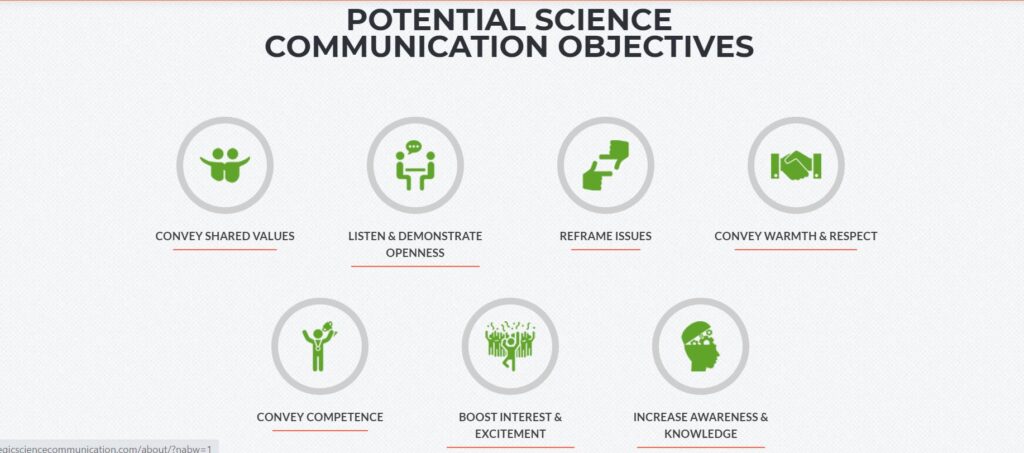Science communicators face a dilemma. Some of the most important contemporary issues in science, from climate change to vaccination, can be highly controversial. That makes communicating effectively about such issues a difficult task. But there are some strategies for writing or talking about controversial science topics in a way that makes it more likely that a person, no matter their beliefs or background, will be more receptive to what you have to say. Getting a handle on these strategies is particularly important in the era of COVID-19, where the effectiveness of a public health intervention like wearing a mask depends largely on whether or not people decide to listen to the messaging.
Acknowledging this, for our first meeting of the fall 2020 semester, the Science Storytelling Society decided to chat about the science of science communication, particularly how to talk effectively about controversial topics. Joining us as this meeting’s invited experts were Dr. Jean Goodwin, NC State Professor of Communications, and Dr. Andy Binder, also a professor in the Communications Department and the faculty advisor for SSS.

Science communication expert and SSS faculty advisor Dr. Andrew Binder presenting to the Science Storytelling Society (virutally!)
We started off the meeting with an icebreaker game where the Zoom attendees were divided into breakout groups. In each of these groups, one person was assigned to role-play a science expert that had just finished delivering a public talk about the importance of drinking water for good health. The other attendees in each breakout room were assigned a very different role: a raucous crowd of activists from the “Anti-Hydration” Facebook group, who remain quite unconvinced of the merits of… drinking water. The goal of the science expert was to do what they could to convince the water-skeptics that drinking water is important.
The purpose of this silly activity was to explore what strategies we use to try to convince people to change their mind about something. Many of the science experts, for instance, tried to convince their audience that drinking water was good because if you don’t drink water you die. This kind of fact-oriented persuasion tactic comes naturally to most people, but we would soon learn that it is, surprisingly, an ineffective strategy in isolation.
Having centered our thoughts on how to communicate with people we disagree with through this icebreaker activity, we moved into the main portion of the meeting, a presentation given jointly by Drs. Goodwin and Binder. Much of Dr. Binder’s research focuses on science communication around controversial topics and he explained how communicating with someone that disagrees with you is, first off, a difficult task. People’s beliefs are often tied to their values as much as their logical evaluation of facts. For that reason, appealing to someone’s logic is often unlikely to result in them changing their mind. Anyone that’s ever gotten into a political argument with a relative on Facebook and shared journal articles in support of their claims likely knows this to be the case! It’s rare indeed to see in a comment thread someone say something along the lines of “oh, I didn’t know that fact before, that’s a good point, I was wrong.”

Expert in communications and rhetoric Dr. Jean Goodwin explaining the ethics of science communication.
This attempt to persuade someone by appealing to facts is known in the communications field as the “deficit model” of communication; the idea being that someone that doesn’t hold a certain belief is lacking (i.e. “deficient”) in some information, and that providing that information will lead them to change their mind. While this style of communication is often reflexive for scientists, numerous studies have found that the deficit model is not a very effective means of communication, according to Dr. Binder.
An alternative approach is an “asset model” of communication. Instead of communicating with someone as if something is missing from them– that you have some knowledge you can deposit into their brain– you should instead frame such interactions in terms of what you and the person you’re communicating with share. While an anti-hydration activist might ignore your appeals to drink water because scientific studies show that it keeps you from dying of thirst, they might be more amenable to a conversation that foregrounds your shared humanity– that you are both people that love their kids and want what’s best for them, for instance.

Science Storyteller Torey Vayer asking a question.
Dr. Binder also suggested a few other specific strategies for more effective science communication, such as having consistent messaging from trusted sources over time, conveying shared values, warmth, and respect, being an active listener and conveying excitement.

One of the resources Dr. Binder mentioned in his talk was www.strategicsciencecommunication.com which produced this graphic.
Dr. Goodwin focused her part of the presentation on the ethics of appropriate science communication. While learning effective strategies for communication is important, it is also important not to neglect people’s personhood and autonomy by forcing your beliefs on them. All people are entitled to think for themselves and ethical science communication is a two-way street that necessitates understanding where someone else is coming from and showing respect for their status as a decision-maker in society. According to Dr. Goodwin, ethical science communication also involves being forthright with your motivations. Scientists and communicators are allowed to be activists and advocates for causes, beliefs, or ideas. But they must be transparently so. By the same token, if a scientist or communicator is acting in their capacity as an advisor to someone else, they shouldn’t force their personal positions and beliefs onto the person they are advising. Instead, they should adhere to their role as someone trying to help someone else think for themselves or make their own decisions.
At the conclusion of their presentation, we had about ten minutes for meeting attendees to chat with Drs. Binder and Goodwin and ask questions about their work.
Thanks to Jean and Andy for being this meeting’s experts! If you missed this month’s meeting you can watch a recording of the meeting here: https://ncsu.zoom.us/rec/share/3Jb030H56bT4KezwbBfi55iwJHOzWm5MnWi_zUQih-SPTYA8G3K098czY5tplfWR.nhzifTFwNPm-eicN
Use the password EN9xa++^ to view the recording.
